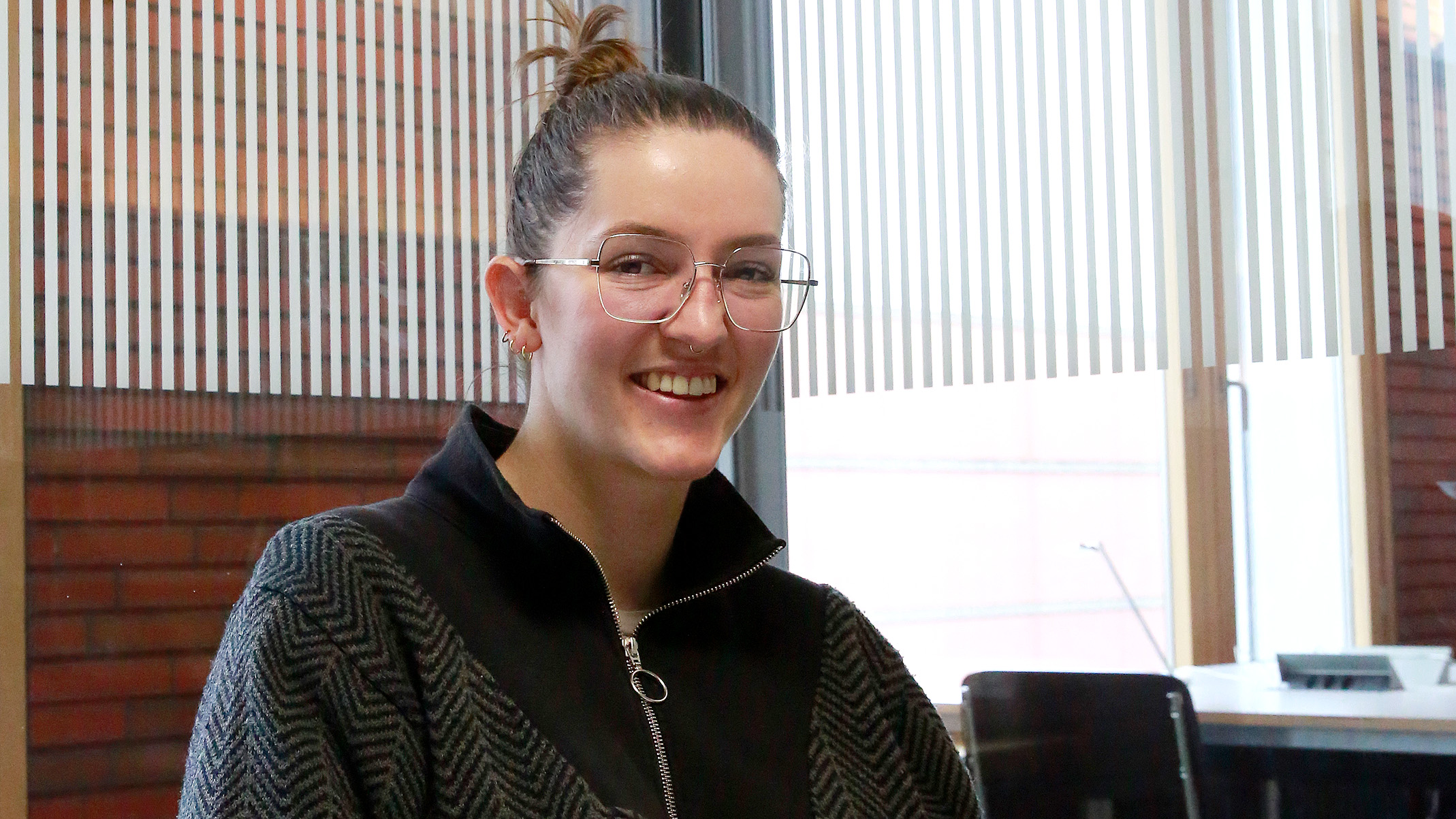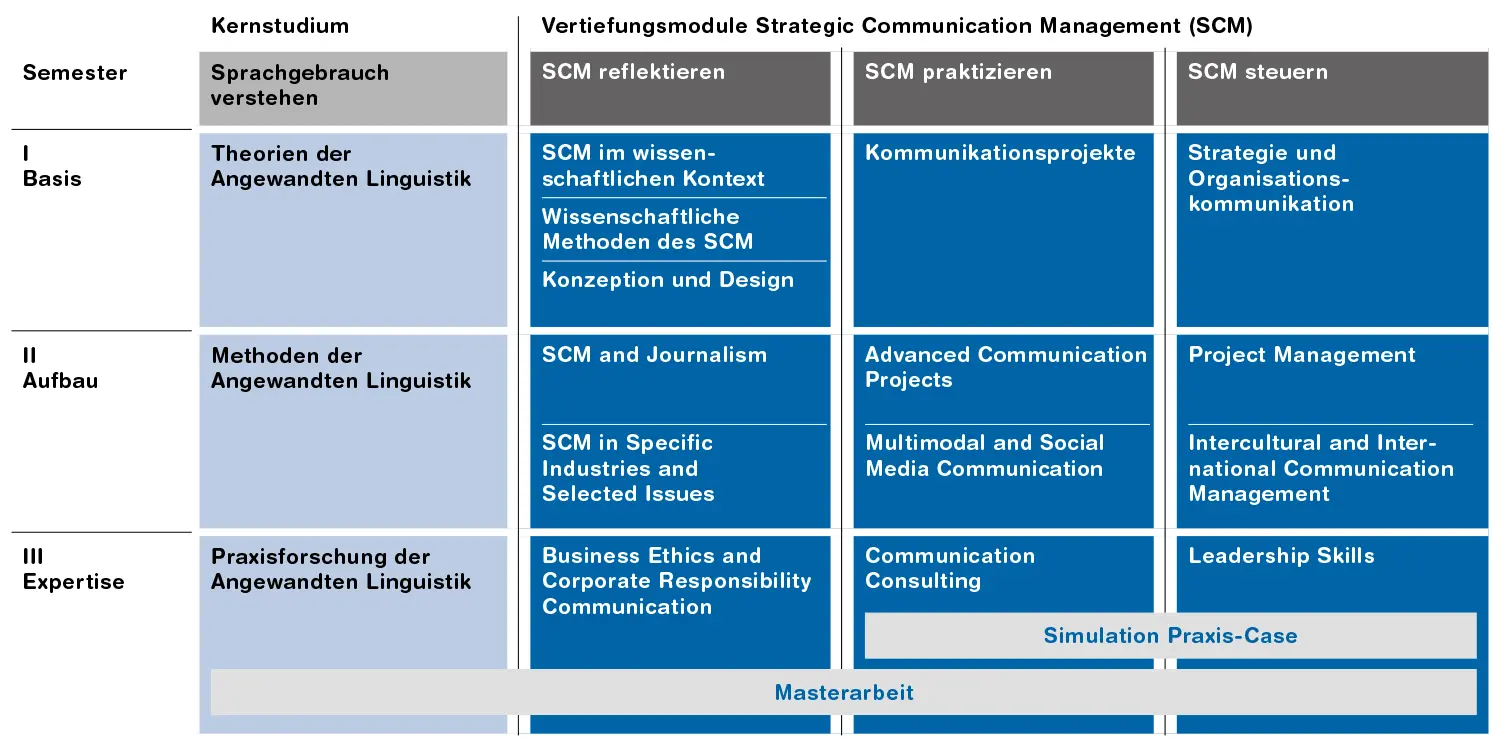Specialisation in Strategic Communication Management
In the specialisation in Strategic Communication Management, you are equipped with the tools you need to handle challenging communication tasks faced at and by companies, public authorities and non-profit organisations. You acquire the skills that enable you to tackle these complex challenges, while at the same time preparing yourself to take on specialist management roles, lead people and draw on international networks to make an impact.
During your studies, you build up both analytical and strategic communication skills that are relevant to practice. Upon embarking on your professional career, you will be able to count on these skills as you master complex tasks in the areas of communication management and consultancy.
The MA programme therefore focusses on the dynamics of organisational communication, i.e. the changes the segment is undergoing, as well as the constants in its development. The special features of international and intercultural communication management play an important role here.
With this knowledge and expertise, you will take on management tasks in the professional world. In preparation for doing so, the MA programme teaches you how to approach specialist management roles and leadership functions in the area of organisational communication in a responsible manner.
You hone your individual profile during practical project seminars and through your Master’s thesis. In the process, you specialise in a current and practice-relevant topic of organisational communication and develop your own strength for taking on professional roles in your chosen career field.
Insights into the degree programme
-

«Ich finde am Master vor allem das Strategische spannend»
Luana Werdenberg studiert im Master Strategic Communication Management und arbeitet in einem Teilzeitpensum in der Kommunikation eines grossen Schweizer Unternehmens. Ihr Berufsziel: Sie möchte ...
-

Die Reputation einer Organisation mit Kommunikation mitgestalten
Nach dem Bachelor Kommunikation und zwei Jahren in der Berufswelt, ist die 26-Jährige Nina Braunwalder wieder zurück an der ZHAW. Hier studiert sie im Master Angewandte Linguistik in der Vertiefung ...
-

Der Master Organisationskommunikation als Sprungbrett zur CCO
Janina Stucki ist Kommunikationsprofi – Daily Business gibt es bei ihrer Tätigkeit bei uhub.io kaum. Kein Tag gleicht dem anderen. Die Absolventin der Mastervertiefung in Organisationskommunikation ...
Career opportunities
The Master’s degree prepares you for a specialist or management position in the field of organisational communication. Accordingly, the programme primarily teaches analytical, conceptual and strategic skills and develops your international and intercultural expertise.
Typical employers include larger companies or SMEs in both Switzerland and Europe as well as global firms, international organisations, associations, public administrations or agencies and consultancy firms.
To help you launch your career, we bring in established professional practitioners during the programme in the form of external and guest lecturers. They provide you with knowledge and skills from various sectors and from different communication functions.
Key information

The modules and courses that make up the core of the programme are based on the latest science. They cover the basic principles and methods of applied linguistics that will help you to reflect on the challenges of professional practice. You familiarise yourself with central topics in applied linguistics and become acquainted with how best to assess communication output in a proficient manner.
The modules of the specialisation in Strategic Communication Management comprise 76 ECTS credits. Of these, 20 ECTS credits are assigned to your Master’s thesis, in which you specialise in a current and practice-relevant topic of organisational communication or applied linguistics. The core modules, which are completed as part of all specialisations, comprise 14 ECTS credits.
You can find all information specific to the specialisation in Strategic Communication Management on this website. All important information about the core modules and other specialisations within the MA programme can be found on the MA in Applied Linguistics page.
The specialisation in Strategic Communication Management pays particular attention to international competencies. You address challenges that internationally active organisations have to overcome in their communication. These include coordinating the content and organisation of communication measures across different countries, interacting with stakeholders from different countries and dealing with key media discourses in other countries. Furthermore, as outstanding English skills are essential for working in international contexts, the teaching language in the second semester is English.
The Master’s degree programme is primarily aimed at individuals with a Bachelor’s degree in communication and media studies, a linguistic discipline or other humanities or social sciences who see their future in the area of corporate communication. For many humanities and social sciences graduates, our Master’s degree programme is an ideal further qualification that will enable them to embark on a career in organisational communication.
Our Master’s classes therefore include graduates from a wide range of Bachelor’s programmes. We make targeted use of this diversity in order to analyse problems and issues from a variety of perspectives and to work on them using different methods. Students thus gain an insight into the way of thinking of other academic disciplines, and there is a valuable transfer of knowledge within the Master’s class.
Part-time study
You can choose to complete the MA in Applied Linguistics on either a full-time or part-time basis. The full-time programme is designed to be completed over three semesters. A part-time programme lasts between four and six semesters and can be applied for in writing via the academic office both prior to the commencement of the study programme and during your studies (subject to certain conditions).
Admission
Successful candidates have:
- strong oral and written communication skills;
- a good general education as well as solid knowledge of current affairs in the realms of economics, politics and society;
- the ability to grasp new concepts quickly; they demonstrate creativity in solving problems, possess the capacity to work under pressure and exhibit intellectual curiosity.
Before you begin the MA programme, you must provide proof of a full-time internship in the area of organisational communication spanning at least three months. For those starting the MA programme with a background in a different discipline, there is also an online bridging course with selected reading material to help you prepare for the programme as part of self-study. You will be provided with further information after submitting your application.
You must fulfil the following formal conditions in order to be admitted to the programme. Details of the documents that you must enclose with your application to the MA programme or submit later if necessary (in German).
- Bachelor’s degree
You must hold a Bachelor’s degree or an equivalent tertiary level qualification in the field of organisational communication. If you have a degree in an unrelated subject area, you are required to take an online self-test in applied linguistics and organisation communication. - Professional aptitude test
The oral professional aptitude test is designed to assess your practical aptitude in the field of organisational communication and your potential for studying at a Master’s level.
During the test, you must demonstrate a basic understanding of organisational communication in practice. This also applies if you do not yet hold any qualifications or possess practical experience in the area of organisational communication. We recommend that you prepare for the interview with literature on the practice of organisational communication as well as by regularly reading public media. - Internship
To be admitted to the programme, you must provide evidence of relevant professional experience or the completion of a full-time internship of at least three months in the field of organisational communication. Evidence in the form of an internship or job reference must be included with the application form. If you do not yet fulfil this requirement at the time you submit your application, you can, on request, supply the necessary evidence at the start of your studies. - Language competence (English/German)
To be admitted to the programme, you must have English language competence of at least C1 level and, in the case of non-native speakers of German, very good German language competence of at least C2 level. You will have to provide evidence in the form of language certificates, Bachelor’s degrees obtained as part of a language-oriented study programme or certificates of extended stays abroad. These documents can be submitted at a later time prior to the commencement of the programme.
Please note that individuals who have been excluded from a Master’s degree programme at other universities that covers equivalent content can no longer be admitted to the corresponding specialisation at the ZHAW.
Dates and deadlines
The application deadline for the MA in Applied Linguistics with a specialisation in Strategic Communication Management is 15 May. Applying in good time will allow you to optimally plan and prepare for your studies. On request, applications submitted at a later date may be considered. Please contact the degree programme office in this regard directly by sending an e-mail to master.linguistik@zhaw.ch.
| Programme start: Spring semester 2026 | |
|---|---|
| Deadline for applications 1 | 15 May 2025 |
| Professional aptitude test 1 | 23 June – 4 July 2025 |
| Deadline for applications 2 | 30 September 2025 |
| Professional aptitude test 2 | 23 October – 7 November 2025 |
